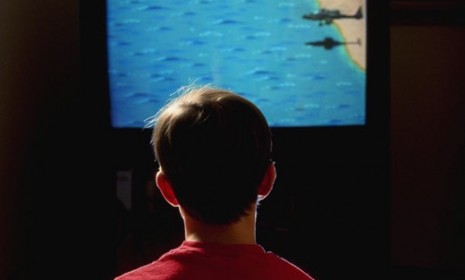Supreme Court strikes down violent video game ban: The right call?
California tried to prohibit the sale of violent video games to minors, but now Grand Theft Auto has the same free speech protections as Grimm's Fairy Tales

A free daily email with the biggest news stories of the day – and the best features from TheWeek.com
You are now subscribed
Your newsletter sign-up was successful
In a "ringing endorsement of free speech," the U.S. Supreme Court voted 7-2 on Monday to strike down a California law that banned the sale of violent video games to minors. "No doubt a state possesses legitimate power to protect children from harm," said Justice Antonin Scalia, who wrote the majority opinion. "But that does not include a free-floating power to restrict the ideas to which children may be exposed." The ruling now puts video games, even extremely violent ones, in the same class of protection as books, movies, and music, with Scalia arguing that children's books that are considered suitable for minors — Grimm's Fairy Tales, for example — "contain no shortage of gore." Did the court make the correct call? (Watch a CNN report about the decision.)
SCOTUS got this one right: Scalia is right to compare violent video games to violent literature, says Hayley Tsukayama at The Washington Post. It really doesn't get "any more gruesome" than that "eye-plucking scene" in Homer's Odyssey. "I get shivers from imagining the torture in George Orwell's 1984," but am "relatively unfazed by the spine-ripping, heart-tearing moves in Mortal Kombat." Parents, not the court, should be the ones who decide "what's appropriate for their children."
"Supreme Court: Books as 'interactive' as video games"
The Week
Escape your echo chamber. Get the facts behind the news, plus analysis from multiple perspectives.

Sign up for The Week's Free Newsletters
From our morning news briefing to a weekly Good News Newsletter, get the best of The Week delivered directly to your inbox.
From our morning news briefing to a weekly Good News Newsletter, get the best of The Week delivered directly to your inbox.
Actually, the court is missing the point: This isn't even a case about free speech, says Carolyn Castiglia at Babble, since no one "is questioning the right of game designers to make video games." The argument is whether those games should be readily available to impressionable children. Moreover, video games are in a different class of entertainment than books, because users actually "control the execution of violent acts."
"DUMB: Supreme Court overturns CA law banning sale of violent video games to children"
But the original sales ban made no sense: California's argument that video games are more interactive than books "never held much water," says Eric Abent at TFTS. As Scalia writes in his opinion, books and movies can be "just as engrossing as video games." Besides, most gamers, "adult and minor," know the difference between reality and fantasy. And while "you may have some difficulty explaining that difference to a 5-year-old," it's unlikely that the tot is the "member of the household heading to GameStop to pick up Black Ops and Halo."
"Supreme Court strikes down California violent video game law"
A free daily email with the biggest news stories of the day – and the best features from TheWeek.com
-
 How the FCC’s ‘equal time’ rule works
How the FCC’s ‘equal time’ rule worksIn the Spotlight The law is at the heart of the Colbert-CBS conflict
-
 What is the endgame in the DHS shutdown?
What is the endgame in the DHS shutdown?Today’s Big Question Democrats want to rein in ICE’s immigration crackdown
-
 ‘Poor time management isn’t just an inconvenience’
‘Poor time management isn’t just an inconvenience’Instant Opinion Opinion, comment and editorials of the day